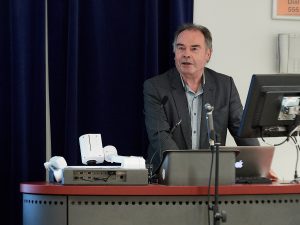Despite struggling with education due to illness, Chantelle Ewen had a dream of getting a degree in Criminology. She came to Birkbeck to study BSc Criminology and Criminal Justice in order to fulfill that dream. This is her story.
Since the age of 16, I’ve struggled with education because of my illness – a condition called Conversion Disorder – which causes neurological systems in my body to shut down, resulting in bouts of prolonged mobility issues, blindness, deafness and speech impairment. I constantly had to miss classes and struggled to do the assigned work. Some of my teachers told me to give up while I could, to just accept that I probably wouldn’t be able to handle further education, let alone higher education, and I almost believed them.
But then I discovered my passion for criminology. I remember being fascinated by the forensic science module in my BTEC science class. We had this presentation to do, and I went completely above and beyond for it. It awakened a burning interest within me – to know about the criminal mind, to understand the processes of investigation and more. I had this dream of getting a criminology degree, and I said to myself: you need to conquer every little thing, every obstacle in your way to do this.
It was someone from the admissions team of a different university who put me onto Birkbeck. They explained it was a unique university, which lets people work or parent during the day (I do both!), and study at night. That very same day I was told about it, I went to Birkbeck’s Bloomsbury campus to look around, and fell in love with it.
I came to Birkbeck and had a heart to heart with the very first lecturer I met. I explained my disability, my educational struggles, and my dream. They told me that I’d get the support I needed to make sure I could achieve my dream, and that they could already see me graduating. It had been so long since a teacher had words of encouragement for me; it was really emotional. Those words became a source of inspiration for me over the three years that I studied. Even when I had to miss a significant amounts of lectures, due to being bed-ridden or not being able to speak, I knew I would keep studying.
My lecturers helped me in every way they could to make sure I didn’t fall behind, and the Disability Support and Study Skills services for students at Birkbeck were excellent. I had access to special software that helped me write essays when I couldn’t move my hands, curated study sessions that helped improve my writing skills, and people willing to help me whenever I needed it.
I’m so grateful to the entire department for their efforts over my three years of studying. Unlike other tutors I’d encountered, they never turned their backs on me, and never allowed me to give up, even when the odds were stacked against me. I can now proudly say that I’m graduating with a degree in Criminology and Criminal Justice, which, back when I was 16 was something I never thought I’d say.
I’m excited for what the future holds. I’m eager to use my degree to get into probation work, working in courts and prisons, and eventually rehabilitation. I know it might be challenging, but why not? My time at Birkbeck taught me not to overthink things, and taught me that I’m capable of much more than I ever imagined.
More Information:

